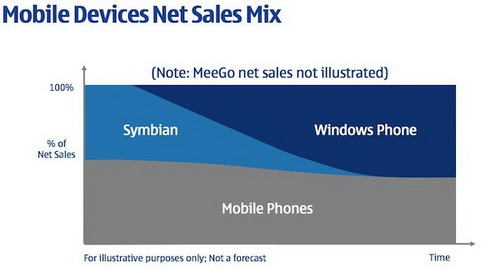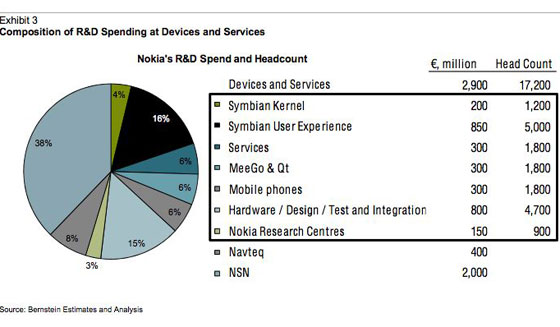Nokia: The Destruction of a Great Company. Step One
The preliminary history does not need much of explanation. For the last few years Nokia was steadily losing its market share. First, it could not respond to the Apple iPhone challenge, then missed the touchscreen phone tidal wave, then began to lose the smartphone battle in the market segment it created. The market leader by the number of devices sold, in the last few years moved from making something to talking about something. While realizing the problems, the company consistently denied them publicly. It tried to rectify the situation, promising a "breakthrough tomorrow". The timetable for that breakthrough was constantly adjusted, even more – some "breakthrough" products became major PR disasters. For example N97 was supposed to change it all and reestablish Nokia as a technology leader, but it turned into a nightmare and made many of the loyal fans switch the allegiance. Then there was the abandonment of the 8000 series as "not smart enough" for today's market. There were lots of mistakes, but until 2010 the company just refused to acknowledge them. The change began to occur in 2010, when some of the top managers, i.e. V-P Anssi Vanjoki talked about unsuccessful devices. At the same time, they did not doubt the general company strategy. For example, Symbian^3 in Nokia's opinion was one of the best OS on the market and was supposed to generate huge sales. My doubts that the first device running it, Nokia N8, is outdated and just boring, turned me into persona non grata for Nokia. I am however happy that the new CEO Stephen Elop publicly admitted that the company has no strong products and its smartphones are outdated. This message is mentioned in his internal Nokia blog post that became public thanks to Engadget. At the joint press-conference with Microsoft he confirmed the post was real. I do not want to repeat everything that he said, there is no need for it, as it is just a story-telling, nothing else. So let's move to the main issue in hand.
Microsoft is the Main Nokia Partner on Smartphone Market
What was the strongest Nokia side on the smartphone market? It was Symbian, one of the first OS made for mobile devices, with proper positives such as low power consumption and long standby and talk times. What was bad in Symbian? Totally outdated interface, losing out to touchscreens from other manufacturers, Apple first of all. Nokia also lost the developers battle, who preferred to develop apps for Apple, then Android, lastly for Nokia phones. Five years ago it was exactly the other way around and that is despite the huge number of devices sold by Nokia.

Nokia is still a market leader among smartphones manufacturers, while Symbian remains the leading OS. At the same time it was achieved because of price drops and replacement of S40 models by similar smartphones. From the second part of 2010 Nokia stopped disclosing data on smartphones sales and labeled the segment convergence devices. You don't have to think long to feel the difference. Just look at the list of devices. You can find here Touch&Type models on S40, but with touchscreens. Are they genuine smartphones? Certainly not. This approach allows Nokia to show excellent results. Not many will pay attention to real sales of S60.
Detailed information on smartphones and Nokia here.
Without the change in strategy the days of Symbian will be numbered. The announcement of Symbian^3 only highlighted the failure of Nokia strategy for smartphones as its market share continued falling down. The company needed a change, but the U-turn we are talking about is definitely negative.
What does it mean when you ditch your own OS and migrate to the one developed by another company. First of all, you cut expenses on R&D (4 billion Euros for Nokia and 17,000 ineffective employees).
Read more about Nokia expenses on R&D here.
The psychological effect is even more important. Unlike other manufacturers Nokia produces mainly phones (70% of its business is concentrated in the area). Its rivals also sell consumer electronics, but Nokia keeps all eggs in one basket. For many years Nokia rested on the summit not due to huge sales, but courtesy of technological advantage generated inside Nokia. I mean design, software and all features. Nokia ruled the world as it offered new ideas and a combination of factors influencing the market of mobile phones. After losing its leadership Nokia started eroding the trust among consumers and became one of many.
The idea to stop creating own OS heralds the inability of Nokia to generate ideas, which will rule the world. Nokia offloads everything, which can be viewed as a burden. As many others it will concentrate on devices, while OS will be created by different companies. The same approach boosted the market share of Samsung. It produces hardware, while the software inside changes little just to differentiate between several models. Best hardware requires minimum investment into software and cuts overheads. To compete with Samsung Nokia had to adapt the same model. Subsequently, Nokia does not feel it can offer good apps and is ready to pay the high price for cutting expenses.
Many believe that a union between Nokia and Microsoft will only result in Windows Phone 7 products, but the changes are more profound. Nokia gives up an opportunity to dominate the market of mobile phones. It is a complete surrender, which nullifies all efforts of the last 6 years. All investment into new generations of devices, technologies and software become useless. Nokia enters the segment with other established players and nobody will make place for the Finnish company. Let's analyze the details of the move and see what gets each participant.
Nokia ecosystem in the hands of Microsoft
Details of cooperation pose some questions and Nokia is surely the weakest side in the deal. Decide for yourself what Nokia gives to its partner and what Microsoft will give it back.
From Nokia to Microsoft:
- Access to OVI Store payment system (payments through SMS from the account of carriers worldwide). OVI Store is abandoned in favor of Marketplace. Both stores will coexist hand in hand until Symbian is around, which means mid-2013 or even later.
- Technologies in mobile cameras and the development of photo solutions on Windows Phone.
- Localization of Windows Phone for all countries and markets. At the moment Nokia is the only company, which can quickly customize phone menus for all markets with high quality and low expenses; Microsoft managed to get only a handful of languages prior to the launch of Windows Phone 7 and new language packs take up to one year to develop;
- New models on Windows Phone 7 will be developed for different price segments and some handsets will not use touchscreens;
- Full access to R&D for WP7 and coordination in the area, while Nokia gets preferences from Microsoft (quick access to development tools and influence on particular features);
- Bing will be installed on all Nokia devices as a default search engine.
- Integration of Microsoft adCenter with all devices;
- OVI Maps for all Microsoft mapping services;
What will Nokia lose:
- Qt will not be used to develop Windows Phone 7 and Nokia will use Microsoft development tools. It means that all developers associated with Nokia smartphones will become redundant. Not numerous they were still loyal to the company, despite all difficulties of cooperation with Nokia. The program of recruiting new developers for Qt (Symbian, MeeGo) may be scrapped.
- In future OVI Store may be closed. See item 1 above.
- MeeGo will become a hothouse of future research instead of a marketable OS for Nokia models;
- Symbian will be substituted by Windows Phone 7 starting with 2012;
I tried to make the list of benefits for Nokia. The use of Bing or adCenter is a purely commercial move, which could have brought much investment to Nokia. It is not a gift from Microsoft. The fact that Nokia will not use Qt is extremely sad. For two years we were told that the arrival of Qt would make it possible for apps developers to work at full capacity and everybody would benefit as a result of the outcome. Now all investment was just wasted. As Symbian is destined to go and MeeGo will remain purely experimental we cannot expect much. Hopefully Qt does not die as I like this framework, but it lost a huge army of developers. Now there is no need to use it. Unfortunately, this good Nokia product was killed inside Nokia. I hope Qt will survive, but don't have high hopes for it.
The key point is that as any other company Nokia will pay for every copy of Windows Phone and gets this OS on the same terms as other manufacturers!!! That's it.
The transition period for Nokia will continue in 2011 and 2012. It will be silly to expect much from the company and all problems will be explained by the move towards a new ecosystem.

What will happen with Symbian and MeeGo
First Windows Phone 7 models from Nokia will appear in more than a year. During this time Nokia has to sell products on the market. It still boasts S30, S40 and S60, so nobody's going to scale down the sales of Symbian handsets abruptly. This OS will still be around in 2012. Here is a scheme how Nokia sees the demise of Symbian.

During the press conference Nokia announced its plans to ship 150 million Symbian smartphones prior to the emergence of Windows Phone handsets. The lion's share will be taken by Symbian S60 5th Edition as the most accessible and heavily promoted in the lineup. A good example of the range is Nokia C5-03, which has neither features nor price to attract users. Symbian^3 will not move into lower price segments (under €200).

If we analyze future sales of Nokia and slight decrease in its market share we will get 4 - 6 quarters to sell Symbian smartphones. The abovementioned amount will be sold in the first quarter or in the middle of 2012 depending upon market tendencies. Interestingly the first Nokia Windows Phone will be unveiled in December 2011 at Nokia World or in January 2012 at CES. At the moment Nokia managers believe that the February 2012 is the priority date of first shipments with the US targeted as the prime market. I am not going to comment on it, but I think Nokia should concentrate on a region where its brand is strong and it is anywhere, but the USA. This decision could have been influenced by Microsoft.
Current Symbian products will still be supported, but the amount of service will be limited. Nokia is unlikely to invest into the OS it is going to get rid of. Once again we should not expect new features and apps for Symbian^3. Even today PR 1.1 firmware shows that we can get bug fixing and not new features. Nothing will change until the end of Symbian life cycle that is 2013. To my mind it is the death of the OS. Independent developers will not be eager to offer new apps for the OS after the clear announcement that Symbian has to go. Ongoing projects can be perfected though.
Savvy users will see no point in buying Symbian products, because they are not going to develop and nothing positive will happen. In other words Nokia has to sell not very attractive products and still get some money for them. Symbian devices will cost pennies. It is some sort of a liquidation sale.
Now I will add a couple of words about MeeGo. At the end of January Nokia discarded a model known as N9-00, which became outdated even before its release. The company also had serious disagreement with Intel and is unhappy with their cooperation. Ongoing agreements do not allow Nokia to shut down the project single handedly that is why it will be an experimental one. By the end of the year Nokia plans to unveil one product. I have a gut feeling it will be a tablet, not a phone (Nokia still plans to ship a MeeGo-related product later this year.). I will not play guessing games, because Nokia is working on a tablet and two phones at the moment. Sadly, all announcements that MeeGo will be a flagship smartphone OS remained empty. It is just another promise, which failed to materialize. Nokia got used to give its word without delivering. Come tomorrow and everything will be fine. Tomorrow has already come and nothing is fine for Nokia.
Restructuring and layoffs at Nokia
On April 1, 2011 Nokia will have a new management structure, which is a third one during the last three years. Can you imagine that? Every year hundreds of people have their functions changed and everything turns into a preplanned chaos. You cannot work well under the circumstances. I will not take your time explaining the new structure as it is not that crucial. I guess in 2012 it will be changed again.
If you want more information about the restructuring go here.
Now let's look at the image of engineers responsible for different projects.

1200 people are responsible for the kernel of Symbian. The interface involves 5000 employees, while MeeGo and Qt need 1800 professionals. In total 8000 Nokia staff members work for OS the company is planning to discontinue.
What will happen with these people? Stephe Elop said nobody will be fired and Nokia would like to employ programmers in new projects. The answer leads to many questions.
Imagine you have a huge company, which services suburban houses. There are 5000 gardeners and 300 electric engineers. When the climate changes you no longer need gardeners. You can fire them or turn into engineers. I think the first variant is easier, because the employees in question may not have qualifications for the painless switch. When moving from Symbian to Windows Phone everything will be changed – from strategy to tools. The main point is that Microsoft develops the OS independently and needs no external help. I do not believe that Nokia will not fire Symbian developers in 2011. If it does not happen Nokia will have to forget about becoming effective, which seems to be its main target at the moment.
A present from Nokia to Samsung, HTC and LG
Unfortunately for Nokia other producers of Windows Phone are not planning to leave the market segment. Moreover, they have good deals with carriers and Nokia will have to fight hard to carve out a niche here. We speak about the segment for Windows Phone, which is very small even in the USA. The integration of OVI Maps into standard Windows Phone under the name Bing Search will make this solution standard and it could be used by any other company. MarketPlace, interface and many other features will be the same in all models on Windows Phone. How Nokia products will differ from competitors in terms of software? There will be no difference. Users will get another model with the same interface. Nokia decided to give away all its competitive advantage and become one of many.
I am not going to mention that in one year and a half Android will be far in front. Nokia will not be able to replace Symbian sales with products on Windows Phone. It is not Math 101. Simple calculations will not work here. Carriers will stop buying Symbian in big amounts due to the drop in demand from users. The market share of Nokia will decrease in the segment of smartphones. In the next two years the market share of Nokia will go down for different products, smartphones including. The danger can be averted only with the help of dumping, but Nokia has no financial resources for this now.
What did Microsoft gain?
This deal is attractive for Microsoft. They get paid for every copy of Windows Phone, while Nokia banks on the OS. Nokia gives its main assets, namely navigation. What will happen with Google Maps and if it can put pressure on Navteq remains to be seen.
It is impossible to find disadvantages for Microsoft. Nokia will boost Microsoft sales courtesy of its decent market outlets, but two chickens will not give you one eagle as Anssi Vanjoki once said about the union of Siemens Mobile and BenQ. Microsoft becomes the main beneficiary in the deal, but its OS will not be significant even with Nokia on board. Similarly to Windows Mobile we will see a huge flop. Neither of the partners have an expertise to offer a viable ecosystem and high quality products. So far they proved it with their deeds not words.
Do you want to talk about this? Please, go to our Forum and let your opinion to be known to the author and everybody else.
Related links
Eldar Murtazin (eldar@mobile-review.com)
 Twitter Twitter  Livejournal Livejournal
Translated by Maxim Antonenko (maxantonenko@ukr.net)
Published — 13 February 2011
Have something to add?! Write us... eldar@mobile-review.com
|







